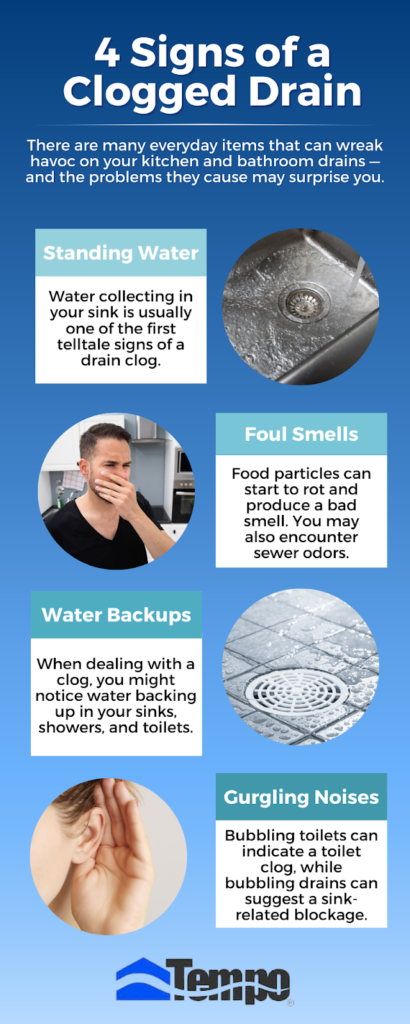Turning on your bathroom or kitchen sink faucet shouldn’t be a hassle. Unfortunately, drain clogs can cause the water to collect in your sinks, leading to a serious mess — and a major problem.
If you’re currently sitting in frustration and wondering why your kitchen sink is not draining, you’re probably desperate for answers. Believe it or not, there are many common causes of clogged drains, including some everyday food items.
Clogged drains are never fun to deal with — especially when you’re in a rush or welcoming guests to your home. Let’s go over some of the top causes of drain clogs so that you can take preventative measures in the future.
What Are the Signs of a Clogged Drain?
Identifying clogged drains isn’t always easy. Although slow-moving drains are some of the most noticeable signs of a clog, there’s more to watch out for. Look out for these four other telltale signs of a blocked kitchen drain:

Solidified Grease, Fats, and Oils
When you cook on the stove, it’s easy to simply throw your dirty pan into the kitchen sink and let the leftover grease drip down the drain. Unfortunately, grease, fats, and oils can quickly harden in your drains — especially during cooler weather when the pipes will be cold.
As you can imagine, solidified grease is one of the most common causes of clogged drains. This grease can block sink drains to the point where water can no longer move through them.
If you want to prevent a clog, local drain cleaning companies will tell you to dispose of grease, fats, and oils properly. You can usually wipe the grease off your plates and pans with a paper towel. In other instances, you may want to collect the grease in a disposable container and toss it in the trash can.
Buildup of Clog-Causing Foods
You might think your garbage disposal can handle all kinds of food waste — but this is far from the truth. Believe it or not, many food items can clog up your disposal and kitchen sink drain. Think coffee grounds, fibrous vegetables, starchy foods, eggshells, and pasta.
Items such as coffee grounds and pasta are common causes of clogged drains because they cling together when exposed to water. If you’ve been wondering why your kitchen sink is not draining as it should, it might be time to rethink your daily habits. For example, if you tend to toss your leftovers into the disposal without a second thought, remember to throw clog-causing foods into the trash can instead.
Hard Water & Soap Residue
Hard water can cause many problems for homeowners, such as strange stains on glasses and silverware or itchy skin. Unfortunately, hard water can also be one of the causes of clogged drains when combined with soap residue.
When soap combines with the various minerals found in hard water, it can form what is called “soap scum.” As this soap scum builds up over time, it can clog sink drains.
Small Objects & Toys
If you’re still wondering why your kitchen sink is not draining correctly, there could be a foreign object that’s become lodged in the drain. Sometimes, these clogs are caused by accident — such as when a child drops their toy into a sink, or dental floss slips into the drain. However, it’s possible that you simply aren’t aware of what can and cannot go into the drain.
For example, feminine hygiene products and cat litter can easily lead to an unexpected blockage in your toilet. The only item that should be going down your toilets is toilet paper. Similarly, hair can clog drains as it becomes tangled, so try not to brush your hair over your sinks. When you’re informed about these situations, you can make better decisions in the future.
Tree Root Intrusions
If you’re dealing with multiple clogged drains at once or your kitchen drain keeps clogging, you could be dealing with a tree root intrusion. The tree roots that grow beneath your home are always searching for a water source, which means they’ll try to break through your sewer lines. If the tree roots find a small crack and worm their way in, they can cause many plumbing problems — including clogged drains.
Schedule a Professional Drain Cleaning With Tempo Air!
So, why is your kitchen sink not draining like it’s supposed to? As you can see, there can be many reasons for this frustrating problem. At the first sign of a drain clog, you might be tempted to dump boiling water into the affected drain or use a store-bought cleaner. However, hot water isn’t always an effective solution, and chemical drain cleaners can damage your plumbing.
If you’re experiencing a clogged kitchen sink with standing water, call the professional plumbers at Tempo Air! Our local drain cleaning specialists serve the residents of Dallas and Fort Worth, TX, and focus on delivering quality solutions that will ensure your water flows like it’s supposed to. Contact us today to schedule your appointment!


